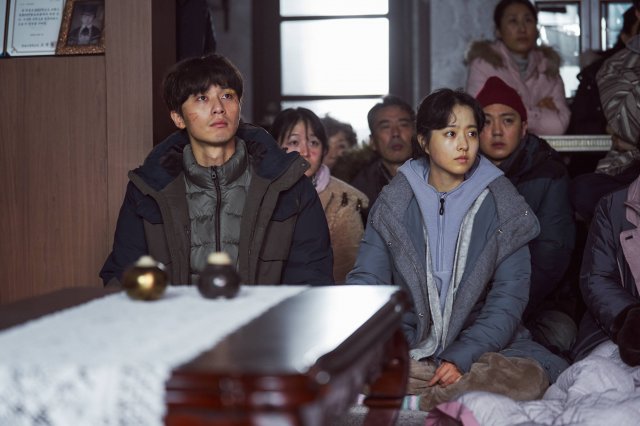[HanCinema's Hawaii International Film Festival Review] "Concrete Utopia"
 By William Schwartz | Published on
By William Schwartz | Published on
Min-seong (played by Park Seo-joon) and Myeong-hwa (played by Park Bo-young) are a young married couple who recently became the proud owners of a relatively high-end Seoul apartment. Their investment pays off more than they were expecting when by sheer dumb luck a catastrophic earthquake destroys nearly all of Seoul, and possibly the world, leaving only their apartment building intact. How and why the disaster happened isn't explained, mainly because none of the characters know.
Advertisement
Indeed, far from being a project in love with its own worldbuilding, "Concrete Utopia" is far more focused on the social drama and practicality of being a survivor in a destroyed city that used to house ten million living people. Min-seong and Myeong-hwa are largely observers in this social drama, which sees the apartment complex try to create some semblance of a functional society. Despite acknowledging that stuff like debt no longer exists in the destroyed world, ultimately, the "Concrete Utopia" defines its membership on those who happened to be living in the apartments when the world ended.
"Concrete Utopia" is deliberately constructed with tunnelvision, not just about what happened to the world, but what the people outside the apartment complex are even doing. The distinction between insiders and outsiders gradually takes on xenophobic undertones. In a particularly unsettling twist, the apartment complex's own propaganda about their superiority causes outsiders to overestimate just how well they're doing. Like any utopia, the "Concrete Utopia" slowly but surely crumbles.
The disaster is less the important part of the story as is the human element. Indeed, by far the most viscerally unpleasant scene in the movie is of a murder that takes place before the earthquake even happens. This isn't to say that "Concrete Utopia" is always pleasant to watch. It's just that the foraging scenes, even when they take a turn for the worse, have a sense of emotional distance. Min-seong is just a part of a mob, not a person in his own right.
Myeong-hwa retains a little more individuality, but also struggles with the main problem of where does anyone go and what do they do, if they can't stay at the apartment complex? There aren't any clear answers to these questions, again, mainly because it's beyond the scope of the immediate conflict. But the strongest characters are able to reach that strength through their obsessive focus on being successful rather than failing, even if that means other people need to be pushed aside.
"Concrete Utopia" is quite reminiscent of "Happiness - Drama" albeit on a scale that's simultaneously smaller and larger than that semi-post-apocalyptic zombie series. Smaller in the sense that there's no big picture plot, but larger in the sense that writer/director Eom Tae-hwa knows when to use his bigger budget to make the maximum impact when necessary. "Concrete Utopia" can get pretty grim, but manages to be reasonably optimistic when it notes that social systems are a human invention after all, and nothing about them is unchangeable.
Written by William Schwartz
___________
"Concrete Utopia" is directed by Eom Tae-hwa, and features Lee Byung-hun, Park Seo-joon, Park Bo-young, Kim Sun-young, Kim Do-yoon-I, Park Ji-hu. Release date in Korea: 2023/08/09.
 William Schwartz
William Schwartz
Staff writer. Has been writing articles for HanCinema since 2012, having lived in South Korea from 2011 to 2021. He is currently located in the Portland metropolitan area. William Schwartz can be contacted via william@hancinema.net, and is open to requests for content in future articles.


